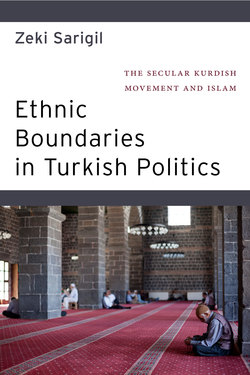Ethnic Boundaries in Turkish Politics

Реклама. ООО «ЛитРес», ИНН: 7719571260.
Оглавление
Zeki Sarigil. Ethnic Boundaries in Turkish Politics
Отрывок из книги
ETHNIC BOUNDARIES IN TURKISH POLITICS
The Secular Kurdish Movement and Islam
.....
Another factor that facilitated the adoption of a more positive stance toward Islam and Islamic actors was electoral pressures (i.e., the rise in popularity among Kurds of pro-Islamic political parties). In the 1990s, pro-Islamic National Outlook Movement parties (i.e., the Welfare Party, Refah Partisi [RP], and the Virtue Party, Fazilet Partisi [FP]), and in the 2000s, the AKP gained substantial electoral popularity in the Kurdish region. As chapter 3 shows, the main political rivals of the secular Kurdish movement in regional electoral politics have been conservative or Islamic political formations. Electoral competition with Islamic or conservative political actors further urged the Kurdish ethnopolitical leadership to accommodate Islam and Islamic actors.
Related to electoral pressures and dynamics, we should also acknowledge the distinct role of legitimacy struggles between Kurdish ethnopolitical elites and their rivals. Both legal and illegal Islamic or conservative groups (e.g., the AKP and Kurdish Hezbollah) and the Turkish state have constantly attempted to delegitimize the secular Kurdish movement in the eyes of the Kurdish masses, particularly among conservative Kurds, by calling Kurdish ethnopolitical actors “Marxist,” “atheist,” “infidels,” “heretical,” or “un-Islamic” and therefore “illegitimate.” In other words, conservative political circles and the state have attempted to contract religious boundaries with an intention to delegitimize the secular Kurdish movement and marginalize pro-Kurdish parties in the electoral contest. My in-depth analysis of the Kurdish case indicates that such boundary-making efforts and boundary struggles or contestations can become intense and antagonistic especially during electoral periods. Facing such labels and accusations, the Kurdish ethnopolitical leadership felt the need to substantially shift its attitude toward religion. Put differently, such boundary work by Kurdish ethnopolitical leadership was also a counterstrategy against its political opponents’ efforts to contract Islamic religious boundaries.
.....